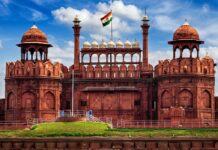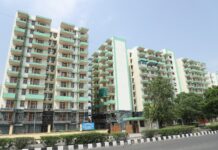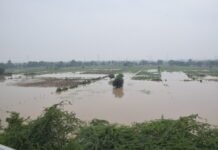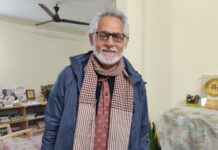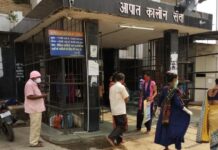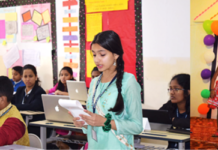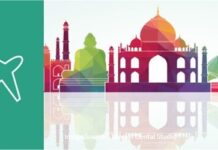[vc_row][vc_column][vc_column_text]
April 1919 was the cruellest month in the history of Punjab. Instead of ushering in the season of mellow fruitfulness and harvest festivities, it brought in a whirlwind of another kind. Instead of collecting the fruits of labour of the months just gone by, it opened floodgates of another kind. Instead of the rulers and the ruled joining in the festival of Baisakhi (Visakhi in Punjabi), it awakened the ghosts of 1857 Mutiny and more recent events just gone by.
The drumbeats of a humongous Rowla (deafening noise in Punjabi) had been set in motion by the rulers. In English it was stamped as Rowlatt Act, passed on 18 March 1919. One of those who heard this Rowla and survived the massacre that followed on 13 April at Jallianwala Bagh in 1919 was 22-year-old Nanak Singh.
Like thousands of others he had gone to the Bagh for a day of fun, festivities and political gossip to keep abreast of developments of the last few days and weeks. Also there, according to Nanak Singh’s grandson Navdeep Suri, was 20-year something Udham Singh, a future revolutionary, and another Amritsar resident Shashti Charan Mukherji – all three unknown to each other at the time.
Unexpected but very touching is the contribution of the great grandson of Sir Sidney Rowlatt, the man after whom the Rowlatt Act is remembered. More of them later. On to 13 April at 5.30 sharp, the Sikhs, Hindus and Mussalman all gathered in the Bagh risking their lives.
“Who could prevent the sons of the nation from sacrificing their lives” asks Nanak Singh in true Punjabi idiom. The Ram Navmi festival just four days earlier had passed off peacefully but with quite some fanfare. Local leaders, Dr Satyapal and Dr Saifuddin Kitchlew, were garlanded and taken out in a procession through the city in an unprecedented show of Hindu-Muslim unity with Hindus and Muslims drinking water from the same glass and
sharing meals.
Next day on 10 April, people came to know about the sudden arrest of their beloved leaders, Dr Satyapal and Dr Kitchlew. A Hartal (shutdown) was declared and a petition was launched for the release of the two leaders. The petition was met with bullets from soldiers posted at the railway bridge that divided the old city and the rulers colony. The dead and the wounded were carried the next to cremation and burial grounds. (Nanak Singh makes no mention of the English casualties of five men killed and assault on a woman mission school superintendent who was left almost for dead).
Come the deadly moment, General Dyer enters the Bagh with his Gurkha soldiers and ordered “Fire” The guns blazed and within minutes thousands of rounds had been fired, felling young and old, falling there and then. Within minutes the Bagh was littered with corpses, dead bodies piling on each other. Only the rarest of the lucky ones escaped.
After the guns stopped, parents came searching for their children, wives for their husbands, sisters for their brothers. “Why, O why, did you come to Punjab, O Dyera (Dyer cursed in colloquial Punjabi which sounds more authentic than in normal translation attempted by Nanak Singh’s grandson diplomat Suri).”
The people who had lost their loved ones wailed and asked: “Had you no pity in your heart or were you drunk at the time, O Dyera. Here is a tankful of our blood, come and have your fill, O cruel Dyera!” And “What answer will you give to Rab (God) when you will appear in His court, O Dyera?”
Nanak Singh the poet asks, “Tell me O Dyera, which Book allows the persecution of innocents? Khooni (blood thirsty man) is the world’s certificate for you from the martyrs, O Dyera.”
Finally, “Oh Lord! Do listen to our prayer, your gentle flock is in utter despair,” reads the people’s postcard of pain for Rowlatt Sahib, Punjab Governor O Dwyer and General Dyer. The people of India sacrificed the flower of their youth to fight your Europe’s war and look what reward we got?” laments the people’s postcard of pain.
The story of Nanak Singh, the Jallianwala massacre survivor who lived to tell the tale, is as rare as the survival of the manuscript itself. It did not see the light of the day for almost 50 years after the event, first because it was banned by the British rulers as seditious material and later because the author did not like to talk about it, and lastly because the few printed copies got virtually lost as public record. But for the Herculean efforts of the author’s grandson Suri and his family members, friends and librarians and archives departments of some of the universities of Punjab, we would not have seen it even in the centenary year of the massacre.
So is the life story of Nanak Singh himself who was lucky to have come out alive from the Bagh that day 100 years ago. Besides being a poet, dramatist and author of more than three dozen books, he is widely regarded as the father of Punjabi novel. Fondly known as Bauji’s; in his family circle, Nanak Singh was honoured with the Sahitya Akademi award presented by India’s President Dr S Radhakrishnan in 1962.
A welcome surprise, the book includes a heartwarming story of Indo-British reconciliation from the descendant of an original player – from the great grandson of Sir Sidney Rowlatt, the eponymous “author” of the infamous Rowlatt report. Justin Rowlatt, the great grandson of Sir Sidney, said on visiting Jallianwala Bagh in 2018: “I wasn’t expecting to react as strongly as I did when I visited Jallianwala Bagh, the walled garden where the 1919 massacre took place. I certainly wasn’t expecting to cry.”
Justin Rowlatt, who was the BBC South Asia correspondent in New Delhi, was sharing his thoughts with Mr Sukumar (SK) Mukherji, the grandson of a 1919 massacre survivor Mr Shashti Mukherji. After wiping his tears, Justin told SK he was “astonished” that he (SK) appeared to feel no animosity to him. “You feel shame, so I feel no anger towards you” SK said. The much talked about official UK apology may not have come from any state authority – from Winston Churchill to Prime Ministers David Cameron or Theresa May in recent times – but a civilian gesture like Justin Rowlatt’s augurs well for Indo-British people to people relations.
[/vc_column_text][/vc_column][/vc_row]
Disclaimer: We do undertake rigorous checks on content provided by contributors before publishing the same. If you come across some factual errors, kindly bring this into our notice and we shall review your objection and claim as per our policy and display correction credits and corrections on the article itself.
The opinion expressed in the article is of the writer. Writer is a freelance journalist/journalist based in Delhi

